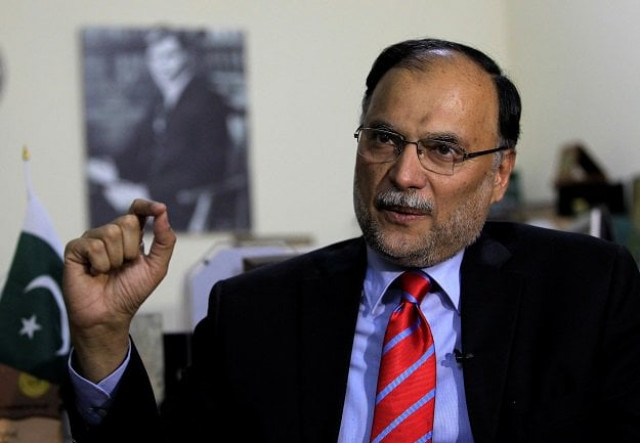Country should think about economic recovery from political shocks
Shock therapies mean losing hard-earned economic gains due to low investor confidence

Interior Minister Ahsan Iqbal. PHOTO: Reuters
He did not think the political turbulence in Islamabad would impact all spheres of the economy. Credit ratings would not go down further than the one allotted by Moody’s, he said. Key drivers of the economy in Pakistan are still overshadowed by the political shock of July 28. “We managed the transition well and that might send the right signal to investors and credit rating institutions including Moody’s,” Iqbal said.
Reassuring them, however, takes a lot after a government is sent packing.
Moody’s had on April 27 warned Islamabad against “high government debt burden and political risks”. It found the landscape changing in 2017, but kept insisting that Pakistan’s credit profile in terms of economic strength based on “very low” institutional strength might erode its fiscal strength, which was already “very low”. This might trigger “susceptibility to event risk”, Moody’s said.
And then came the risk-spelling event on July 28.
Public finance managers of the PML-N government kept pleading that the political shock might increase nervousness of investors and credit rating institutions about Pakistan. They lamented that this might put the economy at further risk, which would prove dangerous for the country’s stability and growth.
But Pakistan has this suicidal habit of going with gravity while suffering politically. Institutions are too weak to interfere for the sake of economic stability. No institution appears to have even a rudimentary sense of stability. Corruption, no doubt, has become a matter of life and death for the country, but there should be an institutional mechanism to prevent instances of corruption. Punishing the corrupt should be a regular feature, not a shock treatment.
Many countries in the world have evolved mechanisms that avert shock therapies. Leaderships in those countries have realised the consequences of treating criminals in a manner that nullifies the economic gains achieved through decades of hard struggle.
But it simply cannot happen in Pakistan. People in high places, the middle and in the street are okay with that. They would prefer shocks over mechanisms just for the dramatic pleasure of it.
Economic slowdown
During the interim government of Shahid Khaqan Abbasi, the prime minister would be busy answering questions about the LNG issue and defending Nawaz Sharif as his mentor. He might not be able to chair emergency meetings for chalking out a strategy for Pakistan to outgrow the political shock that spells economic slowdown.
Under Sharif, the rupee was already losing its worth, exports had dropped to the lowest level in a decade and public debt had surged astronomically. The political shock at this juncture only gave further momentum to the process of decay both on the micro side and in the public finance domain.
This is a situation in which the opposition and the government need to sit together and strike a deal on a single strategy: recovery of economy from political shocks. I do not expect the opposition to go for such a sensible option, but the government needs to keep pushing for it.
The Sharif government was lucky on the economic management side since it was able to reap fruits of a substantial dip in petroleum product prices. But it did not chalk out a plan on how to take the best possible advantage of this historic opportunity. Look at the foreign exchange situation. Despite massive foreign exchange savings due to cheaper petroleum product imports, the government failed improve its reserves commensurately.
After the July 28 political shock, no one would expect the weakened PML-N government to plan a recovery process that can avert the suicidal tendency in treating the economy.
What, for instance, would the Ahsan Iqbal and Ishaq Dar duo plan if they come back on their seats surviving the opposition’s objection to their credentials?
Who would replace them if they are pushed out? What would be the orientation of the new managers of planning and finance? How long would they take to attain the right orientation? On top of all this: how interested would the PML-N leadership be in economic recovery after its chief has been disqualified on the charges of concealing assets.
These questions need honest answers from all sides – institutionally, politically and in terms of political economy. I do not think honest answers are out there on the Pakistani horizon. So, the Moody’s next appraisal might be more shocking with Pakistan disoriented and having no energy to re-plan. That is horrible.
The writer has worked with major newspapers and specialises in the analysis of public finance and geo-economics of terrorism
Published in The Express Tribune, August 14th, 2017.
Like Business on Facebook, follow @TribuneBiz on Twitter to stay informed and join in the conversation.


















COMMENTS
Comments are moderated and generally will be posted if they are on-topic and not abusive.
For more information, please see our Comments FAQ